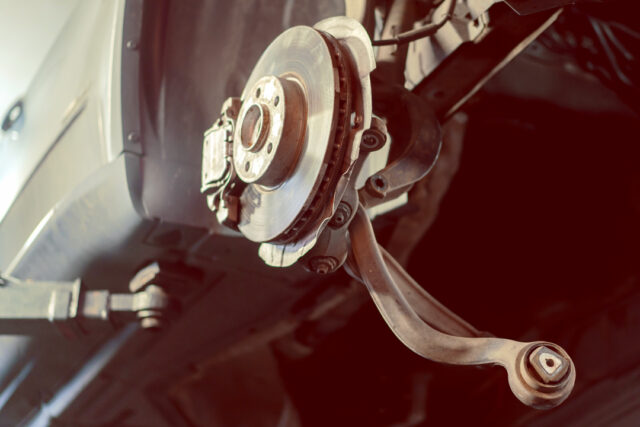When you think about what keeps you safe on the road, brakes might not be the first thing that comes to mind. A sudden squeal, that unnerving pull to one side, or worse, the realization that your car isn’t stopping as quickly as it should, can quickly remind you just how much you rely on them. Brakes are more than just another car part, they’re what you depend on in moments when split seconds matter. Yet, their maintenance often gets overlooked, leading to wear that can put you and others at risk on the road. Regular brake service shouldn’t just be a box to check off for car maintenance. Your brakes should be a primary focus when getting your routine vehicle inspection or check-up.
In this blog, we’ll break down why staying ahead of brake issues is so important, how routine service can save you money and prevent bigger problems, and what signs to watch for before it’s too late. It’s time to take your brake maintenance seriously for your safety.
Why Brake Maintenance is so Important
What’s the one feature on your car that you hope you’ll never need to rely on in an emergency, but absolutely must work flawlessly when the time comes? It’s your brakes.
While seatbelts and airbags often steal the spotlight in vehicle safety, brakes quietly shoulder the responsibility of keeping you out of harm’s way. In fact, research shows that proper braking can reduce accident risk by up to 40%, yet many drivers overlook brake maintenance until it’s too late. Beyond safety, neglecting your brakes can lead to expensive consequences, like prematurely worn tires or damage to the brake system itself. Routine checks and maintenance help your brakes respond efficiently to avoid unnecessary costs down the road, in the event of an accident or emergency repair.
The Risks of Skipping Routine Brake Maintenance
Neglecting brake maintenance can put both you, others, and your vehicle at serious risk. Over time, components like brake pads, rotors, and fluid wear down, reducing the braking system’s overall effectiveness. This can lead to a longer stopping distance, uneven braking, or worse case total brake failure.
Ignoring routine maintenance doesn’t just compromise your safety; it also increases the likelihood of costly repairs. For example, worn-out brake pads can damage the rotors, which can lead to expensive replacements. Additionally, contaminated brake fluid can corrode internal components, which further escalates repair costs. Late-stage signs of brake damage include squealing, grinding, or a vibrating pedal. By the time these warning signs show up, the wear and tear may already be affecting your car’s performance.
Routine Brake Repairs: A Safety Investment
Every brake pedal press activates a complex system designed to stop thousands of pounds of metal in motion. The maintenance process involves more than replacing worn-out pads; it includes evaluating calipers, inspecting brake lines for wear, and ensuring fluid levels are sufficient to maintain proper hydraulic pressure. Each component is interconnected and neglecting one can affect the entire system.
Technicians assess the thickness of rotors and pads to ensure they meet safety standards. Rotors that are too thin can lead to overheating, reducing braking power during repeated stops. Adjustments to brake shoes or parking brakes during routine checks are another critical aspect, often overlooked but important for your vehicle’s overall control. Regular maintenance also includes identifying external factors that might affect your brakes, such as corrosion from road salt or debris buildup from unpaved surfaces.
The Added Benefits of Routine Brake Care
Routine brake maintenance does more than just protect your safety, it also offers several practical and financial advantages. By addressing wear and tear early, you can avoid more extensive and expensive repairs. In addition to cost savings, a well-maintained braking system enhances the efficiency of other vehicle components. Properly functioning brakes reduce strain on tires and suspension, leading to longer lifespans for these parts and smoother overall performance. This interconnected care ensures your vehicle operates more efficiently and reliably, which can even improve fuel economy over time.
Furthermore, staying on top of brake maintenance can reflect positively on your insurance profile. A safer vehicle is less likely to be involved in accidents, which could potentially lower your premiums. Regular care for your brakes, then, is not just a safety measure but a smart investment in your vehicle’s longevity.
Building Good Brake Maintenance Habits
Maintaining your brakes doesn’t have to be complicated, but it does require consistency. Start by following your vehicle manufacturer’s recommended service intervals, which are typically based on mileage or time. These guidelines are designed to catch wear and tear before it becomes a serious issue.
Partnering with a trusted automotive professional is another critical step. Experienced technicians can provide detailed inspections, identify issues you might miss, and use high-quality parts to ensure the longevity of your braking system. Building a relationship with a reliable service provider makes it easier to stay on schedule and address problems proactively.
Finally, consider your driving habits. Avoid unnecessary hard braking, maintain a safe following distance, and be mindful of how road conditions impact your brakes. Small changes in your behavior can reduce wear and help keep your brakes in peak condition. When you pair good habits with regular maintenance, you create a routine that keeps your vehicle safe and reliable for years to come.
The Bottom Line: Prioritize Your Safety
Keeping your brakes in top condition is one of the simplest ways to stay in control on the road. If it’s been a while since your last check, now’s the perfect time to act. Skip the guesswork and ensure your braking system is ready for anything. A quick inspection today means driving with more assurance and avoiding unnecessary risks tomorrow.
Think it’s time to give your brakes the attention they deserve? Stop by your local Kwik Kar for a thorough brake check. Let us help you stay ahead of the wear and tear. Your safety starts here.

